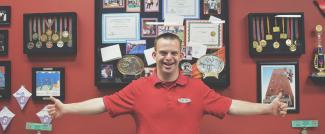Breakfast, Lunch, and Hugs: A Restaurant Owner with Down Syndrome Shares His Gift

By Joseph Sunde
At 14 years old, Tim Harris dreamed of owning his own restaurant. He was born with Down syndrome, so his parents weren’t quite sure what to think. Soon after Tim began his first job as a host at Red Robin, it all started to make sense.
“[Customers] were visibly happy to see him and Tim really developed a following,” says Keith Harris, Tim’s father. “People would come to the restaurant specifically when he was working. As we sat there, we started thinking about how we could harness that for Tim’s benefit.”
Years later, thanks to lots of hard work and the support of his family, Tim’s Place is now open for business, serving “breakfast, lunch, and hugs,” the last of which is the owner’s specialty. “I do not let my disability crush the dreams,” says Tim. “People with disabilities, they can get anything they set their minds to. They’re special. We are a gift to the world.”
Learn more about his story here:
Through his restaurant, Tim is empowered to share that gift with those around him. He provides high-quality food, but he also offers customers a deeper level of affection and connection, one that is impossible not to detect, even from our distant end of the computer screen. Tim is contributing to his community, and his contribution has an impact well beyond the burgers and bacon.
“The hugs are way more important than the food,” says Tim. “The food is food.” Tim sees beyond his disability, viewing his value and worth in terms of something bigger and broader and richer: how he serves others.
Those with disabilities needn’t own a business or contribute via “the market” in order to serve, of course. As Jordan Ballor has noted in a similar context, “Our service of others may or may not be recognized by the marketplace as something valuable or worth paying for. But each one of us has something to offer someone else…Our very existence itself must be seen as a blessing from God.”
But how often do we underestimate the worth and potential of ourselves and others, limiting the range of possibilities? From the mundane aspects of day-to-day stewardship and discipleship to the intricacies of macro-level policymaking, do we really recognize and embrace the dignity and potential of each and every human being? Again, Tim needn’t run a for-profit business to share his gifts with society in a meaningful way, but even his loving and supportive parents were stunned to learn that he might consider it.
Given how frequently business is lambasted as overly materialistic and predatory in its form and function, Tim’s story also offers an illustration of just how beneficial it can be in the “harnessing” of one’s gifts, as Tim’s dad puts it. “Gift and need are divinely matched,” write DeKoster and Berghoef, and business plays a significant role in facilitating the discovery process.
Let us remember that such a divine match occurs in activities as simple and as basic as the transaction of a hamburger…or a hug.
Originally published at the Acton PowerBlog
- Log in to post comments
